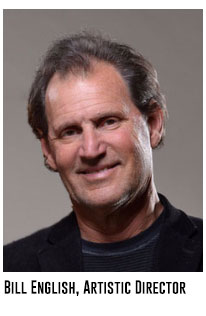 The Temporary Forever
The Temporary Forever
Before I became an artistic director, before I had a scene-shop and drafting associates and amazing carpenters to actualize my artistic vision – I put on one-off productions in whatever available temporary black-box stage I could rent. I wore all the theatre hats; producer, director, actor, stage manager. Designing them as i went along I built all of the sets myself. The morning after a show closed, after all the pizza and beer was gone, I would come into the theatre and tear down the set. Just my handy tools and I; with the company of a wonder bar, a skill saw and a hammer – I would break apart the set, forming a pile small enough to fit in the back of my pickup truck. I would drive out to the dump, back up my truck, and toss my scrap pile into the heap, along with the discarded mattresses and refrigerators. I would make one final sweep of the truck bed for bent nails and sawdust, and then, I would drive away. In the rear view mirror I could see the remnants of “Speed the Plow” or “Dealers Choice” or any other production that I had poured my blood, sweat and tears into. As I drove away I never felt nostalgic for what i was leaving behind.
 The act of destruction served as a kind of catharsis that emptied my heart, clearing up emotional space for the next show to come. Theatre artists understand the transient nature of life. Like little gods, we create serial worlds, with dazzling architecture and lush music.We set fresh beings in motion, clothed as we see fit as they strive to fulfill their hopes and destiny in the brief time allotted to them. Then we destroy that world, literally smashing it into pieces, quickly, if the reviews aren’t good. Many theatre artists repeat this process hundreds of times in our own lives. I wonder how this process affects our world view. Does it makes us cling to things less than those who pursue more conventional careers, or do we become inured to temporariness, missing out on longer term commitments?
The act of destruction served as a kind of catharsis that emptied my heart, clearing up emotional space for the next show to come. Theatre artists understand the transient nature of life. Like little gods, we create serial worlds, with dazzling architecture and lush music.We set fresh beings in motion, clothed as we see fit as they strive to fulfill their hopes and destiny in the brief time allotted to them. Then we destroy that world, literally smashing it into pieces, quickly, if the reviews aren’t good. Many theatre artists repeat this process hundreds of times in our own lives. I wonder how this process affects our world view. Does it makes us cling to things less than those who pursue more conventional careers, or do we become inured to temporariness, missing out on longer term commitments?
Theatre artists have the ability to build relationships quickly. We bare our souls to actors we don’t know and trust our delicate hearts to a director we just met. On stage, we kiss, beg, kill and yearn as if there is no tomorrow. We grow so close to each other that we begin to breathe in unison. And then, suddenly, it’s all over. Quite possibly, we never see each other again.
If we do, some ten years later, it feels as if we’d never parted. Many of us who work in the theatre build hundreds of relationships like this, hidden in a fiction, but the raw ingredients are real. Theatre constantly reminds us of the deeper truth that life is transitory, that we must live each moment to its fullest, for it will pass, soon enough. Yet even as theatre is ephemeral, there is also a touch of the eternal.
Arthur Miller wrote, “There is a certain immortality involved in theatre, created not by monuments or books but through the knowledge an actor carries with him to his dying day that, in an empty and dusty theatre, on a certain afternoon, he cast a shadow of a being that was not himself but a distillation of everything he had ever thought or felt. All the un-singable heart songs that the ordinary man may feel but never utter he gave voice to and, by that, he somehow joins the ages.”
Miller’s profound insight reminds me of an actor who played Medea in a country Western adaption by Lee Brady that I saw several years ago. Betrayed, disowned, cast aside, humiliated in front of her husband’s new bride, Medea cannot contain her rage; it bellows up out of her to take over her body and she watches helplessly as she kills her own children. As the actor embodies all of this, both she and the audience know that 2,500 years ago, another courageous woman invited the words of Euripides into her heart and loins and let the spirit of Medea possess her. And these two actors, separated in time by millennia, merge together as one. Whether from the Greek theatre, Shakespeare, O’Neill, Lillian Hellman, Annie Baker, or Stephen Adly Guirgis, theatre reminds us of what is eternal in humanity, of who we are and have always been.

Theatre, as it should, reminds us that life is both fleeting and everlasting. Like the ocean, theatre is always the same and never the same. I believe that when we enter the theatre lobby, if we take a brief moment to consider this awesome contradiction, then we can more fully immerse ourselves in the transient, yet eternal world we build on the stage.
All the best,

Bill




Hi, Nice post. I am looking forward to see a lot more of your blog.